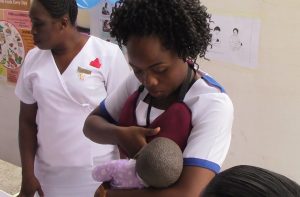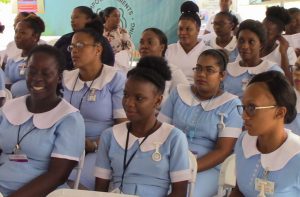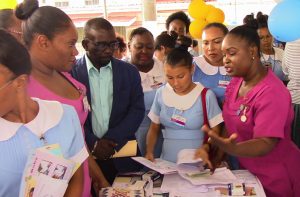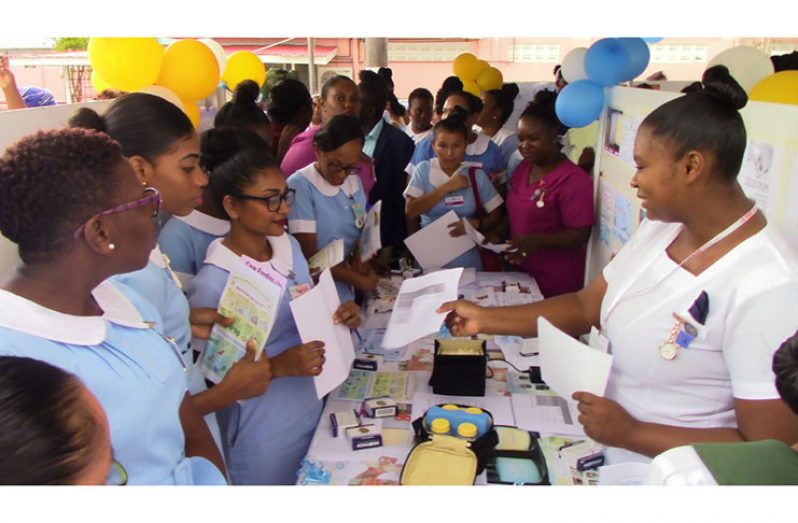By Elvin Carl Croker
THE Georgetown Public Hospital Corporation (GPHC) has issued a call for the implementation of a policy that will see breastfeeding mothers having a full six months of maternity leave instead of only three months as it exists now and an extension of parental leave across the country.
“We educate our mothers about breastfeeding for the first six months of life, but yet our policy of returning to work after three months hinders that goal for working mothers. This brings to focus the discussion of an extended three months of maternity and parental leave from our National Insurance Scheme,” said Assistant Director Nursing Services Celeste Gordon, as she addressed a health fair to celebrate National Breastfeeding Week last Thursday.

National Breastfeeding Week this year is observed from September 15 -21 and is held under the theme, “Empowering parents, enabling breastfeeding.”
Gordon further said that in Guyana the majority of unemployed mothers are not covered by the maternity and protection policies.
In this regard, she advocates the construction of a day care centre accessible to working mothers at the GPHC and a breastfeeding room in areas within workplaces accessible to working mothers, so that they can have a space.
She noted that the lack of support for parents at work is a barrier for empowering women.
The benefits of breastfeeding are numerous and according to the WHO, only 40 percent of infants less than six months are exclusively breastfed globally. It is further stated that if breastfeeding were scaled up to near universal levels, about 820,000 children’s lives would be saved every year.
The health fair was held with a focus to empower not only women who come for services at the GPHC, but women in the general public at large about the importance of breastfeeding. As such, the theme was done with a focus on the family’s involvement to enable breastfeeding and helping parents to create that bond with their children in early life.

It is the hospital’s view that the 91 days’ maternity leave to recover from birth and breastfeeding is a good start; however, as mothers return to work, their ability to continue breastfeeding regularly depends on having access to breastfeeding facilities and brings into focus a safe, private and hygienic space for expression and storage.
Chief Executive Officer (CEO) of the GPHC, retired Brigadier George Lewis in his support for the call said fathers should be encouraged to be part of breastfeeding to create a bond with their babies and to assist the mother with household chores.
Lewis referred to the call made by the World Health Organization (WHO) and the United Nations Children’s Fund (UNICEF). In that call, it was pointed out that a collaborative effort should be made to improve breastfeeding by having a comprehensive breastfeeding programme and improved counselling, offering support to women in the workplace and community as a whole.
This, he said, can be achieved by working together with support from the Ministry of Public Health, employers and communities as a whole.
“We have the power to enable breastfeeding and support families in fostering and nurturing our environment for our children,” he said.
The CEO said breastfeeding is a normal way of providing young infants with nutrients they need for healthy growth and development. Mothers, he added, should breastfeed their children once they are provided with the support of family members, the support of the health care system and the support of society.

“Exclusive breastfeeding is recommended up to six months of age with continuous breastfeeding along with appropriate supplementary goods up to two years of age; the benefits of this are numerous both for mother and child,” he said.
In sharing some of the health benefits of exclusive breastfeeding, the hospital boss said it helps with the natural method of birth control; in fact, he said it is believed that it prevents 98 percent of pregnancies.
“Breastfeeding also helps to reduce the risk of ovarian and breast cancers, diabetes, depression and a number of other illnesses. It is safe and contains antibodies that protect the infant from common childhood illnesses such as diarrhoea and pneumonia,” he counselled. Noting that one of the immediate benefits is that it contributes to a lifetime of good health.
Lewis said that breastfeeding is a learned behaviour that not all mothers decide to do, noting that some of the factors that prevent mothers from breastfeeding are a lack of knowledge; brief maternity leave; the number of feeding breaks on the workplace and in some cases, discomfort that the mothers experience through soreness and redness of the nipples.
In this regard, he called for both old and new mothers to be educated on what to expect during breastfeeding and the benefits of breastfeeding, so that they will embrace it and thus nurture healthy babies who will become healthier adults and be able to contribute to national development.
“As you encourage others to breastfeed, do so with diligence, and always remember to do so considering the dignity of the mother. You must respect them and understand that persons have biases based on different factors such as religion, culture, beliefs and others which may affect them wanting to breastfeed. Therefore, you have to exercise patience and tolerance to achieve your goal, which is to make every mother who delivers in the GPHC breastfeeding for at least six months,” he told the staff of the maternity unit of the GPHC.
He encouraged the staff to maintain and improve their efforts at educating mothers that “breast is the best” and that this nation’s health and well-being depend on them.
The GPHC achieved “baby-friendly” status in August 2016. As such, it is the role of the hospital to sensitise and educate both staff members and the general public at large that breastfeeding is everyone’s business. To this end, the hospital has placed its focus on helping breastfeeding mothers, along with other family members to exclusively breastfeed.
Evidence has shown that exclusive breastfeeding for as long as possible can strengthen development of the child’s brain, which creates a positive impact over a lifetime. It also protects maternal health and reduces the risk of having breast and ovarian cancers in women; it also helps to improve their physical health and enhances general family well-being.
Adolescents and adults who were breastfed as babies are less likely to become overweight or obese, less likely to have Type Two Diabetes and it is believed that they have greater intelligence.
Breastfeeding is not a choice, it is a responsibility, and it is the best investment in saving lives thus improving health, and social
and economic development of individuals in the nation.
In commemorating activities for National Brestfeeding Week, staff and management of the maternity unit of the GPHC believe the health fair will serve to educate persons on the topic.
The GPHC is fully supportive of breastfeeding and has renewed its commitment to work with the Ministry of Public Health, other government agencies, the Pan American Health Organization and the World Health Organisation. This is with a view to developing policies and action programmes that promote and advocate breastfeeding; this includes legislation to protect commercial biases and to facilitate opportunities for working mothers to be able to breastfeed their babies and work at the same time.



.jpg)








